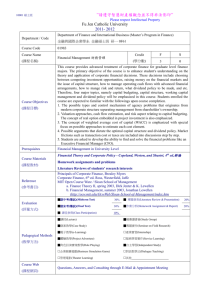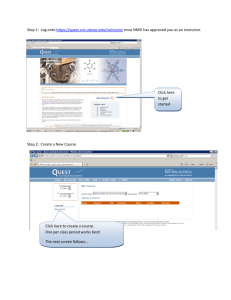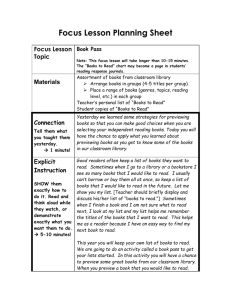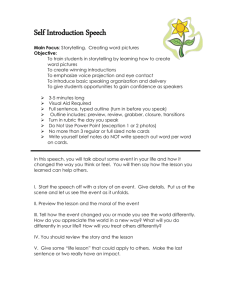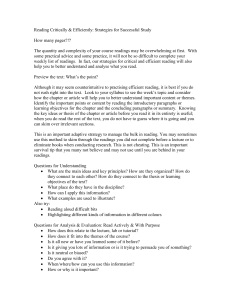Fu Jen Catholic University
advertisement
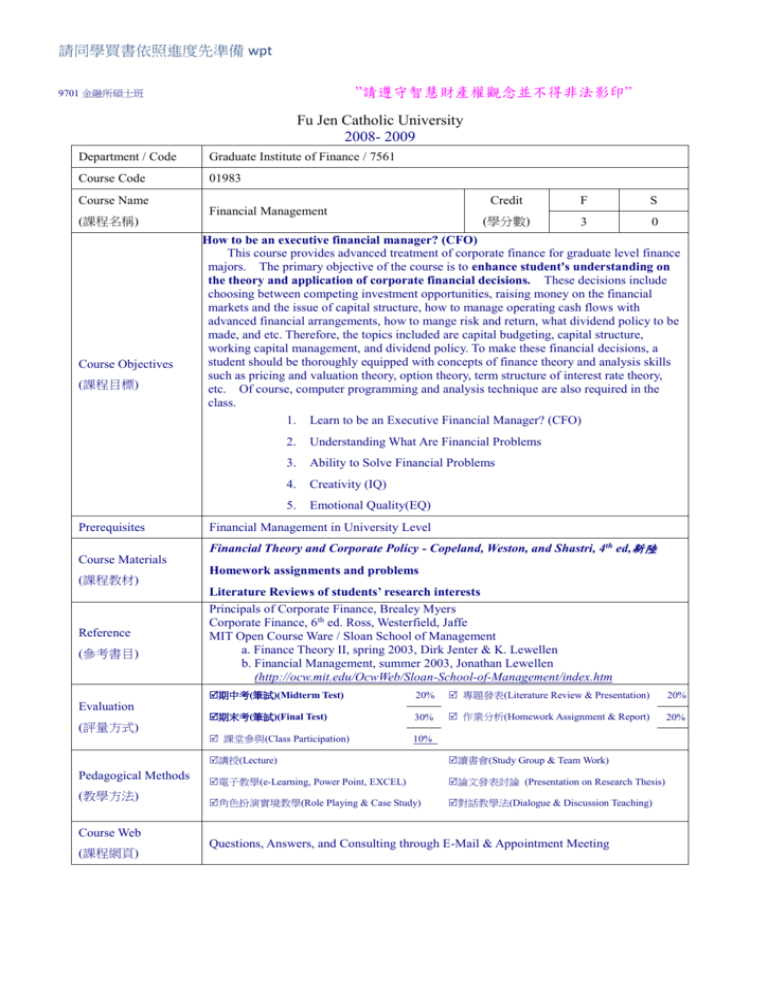
請同學買書依照進度先準備 wpt ”請遵守智慧財產權觀念並不得非法影印” 9701 金融所碩士班 Fu Jen Catholic University 2008- 2009 Department / Code Graduate Institute of Finance / 7561 Course Code 01983 Course Name (課程名稱) Course Objectives (課程目標) Prerequisites Financial Management Credit F S (學分數) 3 0 How to be an executive financial manager? (CFO) This course provides advanced treatment of corporate finance for graduate level finance majors. The primary objective of the course is to enhance student's understanding on the theory and application of corporate financial decisions. These decisions include choosing between competing investment opportunities, raising money on the financial markets and the issue of capital structure, how to manage operating cash flows with advanced financial arrangements, how to mange risk and return, what dividend policy to be made, and etc. Therefore, the topics included are capital budgeting, capital structure, working capital management, and dividend policy. To make these financial decisions, a student should be thoroughly equipped with concepts of finance theory and analysis skills such as pricing and valuation theory, option theory, term structure of interest rate theory, etc. Of course, computer programming and analysis technique are also required in the class. 1. Learn to be an Executive Financial Manager? (CFO) 2. Understanding What Are Financial Problems 3. Ability to Solve Financial Problems 4. Creativity (IQ) 5. Emotional Quality(EQ) Financial Management in University Level Financial Theory and Corporate Policy - Copeland, Weston, and Shastri, 4th ed,新陸 Course Materials (課程教材) Reference (參考書目) Evaluation Homework assignments and problems Literature Reviews of students’ research interests Principals of Corporate Finance, Brealey Myers Corporate Finance, 6th ed. Ross, Westerfield, Jaffe MIT Open Course Ware / Sloan School of Management a. Finance Theory II, spring 2003, Dirk Jenter & K. Lewellen b. Financial Management, summer 2003, Jonathan Lewellen (http://ocw.mit.edu/OcwWeb/Sloan-School-of-Management/index.htm 期中考(筆試)(Midterm Test) 20% 專題發表(Literature Review & Presentation) 20% 期末考(筆試)(Final Test) 30% 作業分析(Homework Assignment & Report) 20% 課堂參與(Class Participation) 10% (評量方式) Pedagogical Methods (教學方法) 講授(Lecture) 讀書會(Study Group & Team Work) 電子教學(e-Learning, Power Point, EXCEL) 論文發表討論 (Presentation on Research Thesis) 角色扮演實境教學(Role Playing & Case Study) 對話教學法(Dialogue & Discussion Teaching) Course Web (課程網頁) Questions, Answers, and Consulting through E-Mail & Appointment Meeting Week Course Outline Date 1 9/19 2 9/26 3 10/03 4 10/10 5 10/17 6 10/24 7 10/31 8 11/07 9 11/14 10 11/21 11 11/28 12 12/05 13 12/12 14 12/19 15 12/26 16 01/02 17 01/09 18 01/16 (課程大綱進度) Topic Introduction to Class & Financial Management: Cash Flows, Principal of Valuation, & Financial Markets HWA1: Valuation Methods and Models? Preview Chapter 13. Ch. 13: The Role of the CFO, Performance Measurement, and Incentive Design Preview Chapter 14. Ch. 14: Valuation and Tax Policy Cost, Market, and Earning Approaches HWA2: Cash Flow Estimations? (Equity, debt, Asset) Preview Chapter 9 National Holiday Ch. 9. Multi-period Capital Budgeting under Uncertainty: Real Options Analysis HWA3:Growth Rates Estimations? (perpetual vs n yr life) Ch. 9 (Continued) Preview Chapter 15 Ch. 15: Capital Structure and the Cost of Capital HWA4: Costs of Capital Estimates (Equity, Debt, Asset) Chapter 15 (Continued) : HWA discussion and Review Mid-Term Examination 期中考 (Ch. 9, 13, 14, 15) Preview Chapter 16 Ch. 16: Dividend Policy: Theory and Empirical Evidence HWA5: Valuation Wrap-Ups (Equity, Debt, Asset, Stock) Ch. 8. The Term Structure of Interest Rates, Forward Contracts, and Futures Ch. 8. (Continued) HWA6: Risk Analysis – Sensitivity Study Research Interest 1-3: Literature Review Presentations Preview Chapter 17 Ch. 17: Applied Issues in Corporate Finance Research Interest 4-6: Literature Review Presentations Ch 17 (continued) Research Interest 7-9: Literature Review Presentations Preview Chapter 18 Ch. 18: Acquisitions, Divestitures, Restructuring, and Corporate Governance Research Interest 9-12: Literature Review Presentations Preview Chapter 19 Ch. 19: International Financial Management (Optional) Research Interest 13-15: Literature Review Presentations Preview Chapter 20 Ch. 20: Unsolved Issues, Undiscovered Territory, Future of Finance (Optional) Research Interest 16-20: Literature Review Presentations Final Examination 期末考 (Valuation & Ch. 8, 16-19) Contribution to 全人教育 做中學 Mission (Holistic Education) (Learning by doing) (本課程與管理學院 人本價值 整合資源 創新知識 國際視野 使命之關係) (Human-centric values) (Resource integration) (Innovative knowledge) (International view) Contribution to learning goals: management college (本課程能達成開課 單位的哪些目標-院) 掌握投入之專業知識內涵並能建立起一套學習及研究的方法。 Each student should be able to recognize the appropriate methods and procedures of research pertaining to their area of specialization. This learning goal is met through the completion of their thesis projects. 能整合理論與實務,提升各種組織之績效。 Each student should be able to integrate theory and practical applications to increase the productivity of organizations. This learning goal is met through the course embedded exams. 拓展國際視野與觀點,提升其國際化能力。 Each student should be able to expand their global perspectives to adapt to internationalization. This learning goal is met through the course embedded exams. 善用現代資訊科技於資源之統整與應用。 Each student should be able to capitalize on modern information technology in the integration and use of resources. This learning goal is met through the course embedded exams. 建立正確的專業倫理與人本價值觀念並應用於專業的決策中。 Each student should be able to recognize professional ethics and human-centric values, and be able to apply them in professional decision-making. This learning goal is met through the course embedded exams. 完備財務金融理論之訓練及提升對金融市場與商品之了解。 Contribution to learning goals: Graduate Institute of Finance (本課程能達成開課 單位的哪些目標-所) Instructor (老師資料) Each student should be able to possess comprehensive financial theories and understand the financial market and its products. This learning goal is met through the course embedded exams. 提高對研究方法流程之熟稔度及各研究工具之操作能力。 Each student should be able to understand research methodologies and processes, and the ability to apply research tools. This learning goal is met through the thesis writing. 培養理論與實務之整合能力。 Each student should be able to integrate theory and practice. This learning goal is met through projects. 激發關心時事及國際趨勢發展的習慣與態度。 Each student should be aware of current events and international development trends. This learning goal is met through the case studies. 培育邏輯分析與金融問題解決的能力。 Each student should be able to possess abilities in analytical thinking and problem solving. This learning goal is met through thesis writing. Wei Pen Tsai 蔡偉澎 E-mail: wpt@mail.fju.edu.tw Phone: 29053998 Office Hour: Wednesday, Thursday, Friday 15:30 -17:30pm Room: SL424
